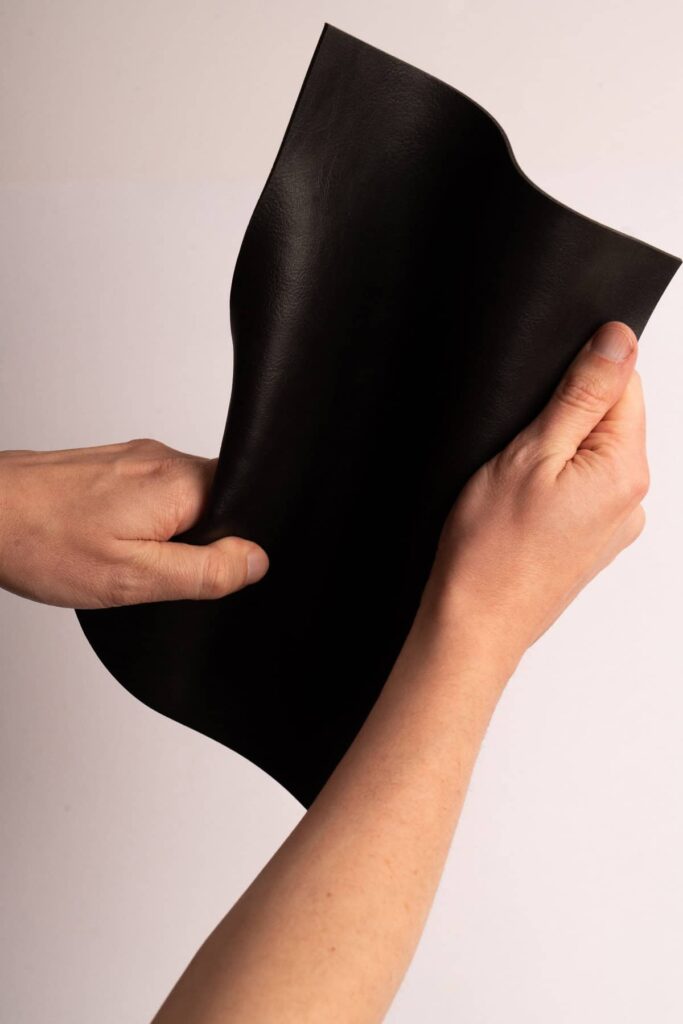Uncaged Innovations Bags $5.6M for Plastic-Free Leather Made From Grain-Based Protein
4 Mins Read
US startup Uncaged Innovations has raised $5.6M in seed funding to commercialise its grain-based, plastic-free leather alternative.
Uncaged Innovations, which makes vegan leather from grains, has closed a $5.6M seed investment round led by Green Circle Foodtech Ventures and Fall Line Capital, with Ponderosa Ventures, Golden Seeds, and InMotion Ventures (the VC arm of Jaguar Land Rover) also participating. The latter was also part of the biomaterials startup’s $2M pre-seed round in June 2023.
While the previous capital injection was earmarked for scaling up operations to produce millions of metres of its alt-leather annually, the latest round will help it build out its manufacturing team and bolster its market launch plans.
“What Uncaged Innovations has achieved with its grain-based technology is a significant breakthrough in an industry that has long awaited a breakout innovation,” said Green Circle Capital founder and managing director Stu Strumwasser.
“The opportunity is enormous, and we believe that their ability to provide a high-quality material that is scaled and price competitive is a game-changer,” he added.
Using plant collagen to make truly sustainable leather

Founded in 2020 by CEO Stephanie Downs and Xiaokun Wang, the New York-based startup claims to be the first to have developed leather made from grains.
It does so by deploying its tech platform, BioFuze, with roll-to-roll manufacturing techniques. Uncaged Innovations blends plant-based collagen with other biomaterials to build a fibral network that replicates the texture and performance of animal-derived leather.
“When we started our research, we analysed what makes leather, and we learned that the real magic of it is that collagen can behave in specific ways that give the leather the structure it has,” Downs told Business Insider. “So we decided to look at the plant kingdom – and use plant proteins from grains.”
Conventional leather is derived from animal hide, and has previously been thought of as a byproduct of the meat and dairy industries. Supporters of the industry tout its biodegradability and longevity as supposed sustainability credentials, but critics argue it is more a co-product than a byproduct – and in many cases, it’s the primary product.
Producing leather is an energy– and water-intensive process linked to deforestation and biodiversity loss. Aside from the animal exploitation aspect, it also has a much higher carbon footprint, at 110kg of CO2e per square metre, compared to synthetic and plant-based alternatives.
But synthetic leather has its own problems. It contains plastic, a notoriously planet-harming material that takes between 20 to 500 years to break down and decompose. Plastic production is responsible for 3.4% of global emissions, and its contribution is set to double by 2060. Plastic-based leather can also shed toxic microplastics that can enter waterways – thus destroying aquatic life, and our food system.
Uncaged Innovations’ version is plastic-free and fully biodegradable (thanks to a corn-based coating). And an independent life-cycle assessment has shown that its grain-derived leather emits 95% fewer greenhouse gases, requires 93% less water, and consumes 72% less energy than conventional leather.
Uncaged Innovations working with luxury brands

The company makes leather alternatives primarily for the fashion, consumer goods and automotive industries. “We’re an ingredient in their designs, and we work with a lot of the largest fashion houses and many well-known brands,” Downs told Business Insider.
She revealed that Uncaged Innovations is currently developing prototypes for Jaguar Land Rover and is in talks with several luxury brands, with plans to reveal its first collaborations “in a couple of months”.
The grain leather’s flexibility will attract manufacturers: it can be formulated to different durability levels to suit a wide range of applications, and can be dyed during production, forgoing the need for tanning, which generates lots of hazardous chemicals that are a detriment to human health.
“While others have attempted to replicate leather using various inputs, we felt the use of structural proteins to mimic collagen was transformational,” said Fall Line Capital founder and managing director Eric O’Brien.
“We understand the margin pressure farmers face growing commodity grains, and we are constantly on the lookout for ways to help them capture more value from their production,” he added. “By diversifying and applying greater value to agricultural streams, we can strengthen our farm systems and provide consumers with more sustainable goods.”
And consumers do want more sustainable goods. A 20,000-person global survey this year revealed that 85% of people are experiencing disruptive climate change effects, and 46% are buying more sustainable products to reduce their personal impact. In fact, 80% are happy to pay more for them for greener products, with an average price premium of 9.7%.
“The tide has turned aggressively toward materials that are sustainable, and we plan to capture that momentum,” said Downs. “This funding round brings Uncaged another step closer to achieving our ultimate goal of disrupting every industry that relies on leather.”



